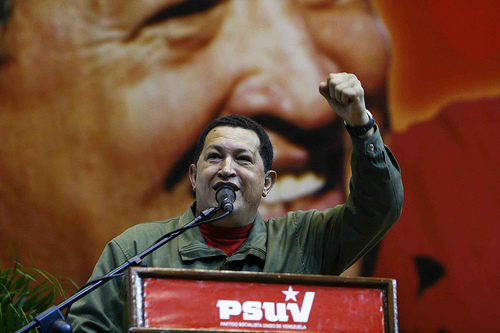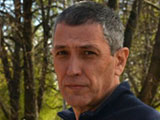Answered Prayers
by Israel Centeno / July 3, 2012 / No comments
The church of King Hugo, supreme leader of Venezuela

President Hugo Chávez, 2008. Photo: flickr user ¡Que comunismo!, Creative Commons.
“There are more tears shed over answered prayers than over unanswered prayers”
–St Teresa of Ávila
King Hugo is the supreme leader of the people of tropical Venezuela.

- From his lonely watch post Albert Camus asked who among us has not experienced exile yet still managed to preserve a spark of fire in their soul. “We’re all alone,” Natalia Sedova cried in exile on hearing of her husband Leon Trotsky’s affair with Frida Kahlo. In his novel Night Watch, Stephen Koch follows the incestuous love affair of David and Harriet, wealthy siblings watching the world from their solitary exile. Koch’s writing, Camus’s theories, and Trotsky’s affair all come back to exile and lead me to reflect on the human condition. From my own vantage point, my Night Watch, I will reflect on my questions of exile, writing, and the human condition.

- Israel Centeno was born in 1958 in Caracas, Venezuela, and currently lives in Pittsburgh as a Writer-in-Residence with City of Asylum/Pittsburgh. He writes both novels and short stories, and also works as an editor and professor of literature. He has published nine books in Venezuela and three in Spain.
King Hugo commands us from on high – sometimes from Havana, other times via Twitter – at more than 900 knots an hour. When we speak to King Hugo, we do so thusly: “King Hugo, who art in heaven at thirty-three thousand feet…” Or, “@reycandanga, who sendeth messages via Twitter…”
King Hugo preaches to us at home every Sunday. Or, when it strikes his fancy, he speaks from China, Syria, or Malaysia. He wants to save the world. After suffering from a long illness and while still in recovery, having been summoned by atheists and believers alike, he has returned with heroic war-cries to bring his epic tale to a climax.
King Hugo converts us into men of faith. He who is not with him will not be seated at the right hand of the Father—King Hugo himself—and will lose their legitimacy, lineage, or citizenship, sealing their stateless fate.
He makes us humble. King Hugo teaches us that being rich is very wrong, and that it’s easier for St. Diosdado Cabello and St. Nicolás Maduro to enter their manors in the putrid East of Caracas*, or for an army general to buy and remodel his La Lagunita Country Club mansion, than it is to thread the eye of a needle (or for one of Diosdado’s balls to go into a hole on the golf course).
King Hugo said, “Let the children come to me, for to such belong the Kalashnikovs.”
King Hugo performed the miracle of dividing the bread and the collective contracts. King Hugo, in his love supreme, prepares us for an asymmetrical jihad against the great Satan of the north, from whom his ministers and generals buy their daily supplies for the upkeep of their humble abodes.
King Hugo has promised to bring the thieves with him in his ascent to the kingdom: “You will be with me in paradise.” The thieves in King Hugo‘s kingdom buy fast, armed helicopters and close contracts worth millions with the various strata of devout revolutionary Mafias…and non-revolutionaries.
King Hugo is pious. He has promised eternal life, or eternal fuel, for Fidel and Bashar Al-Assad.
“If any man would come after me,” shouts the recovering convalescent, “let him deny himself and take up his cross.” Begging and with nothing but scraps, with King Hugo, the god of the armies, I’ll stay.
For these and many other miracles, performed in as little as thirteen years of social redemption, we finish with the prayer that King Hugo has taught us. We utter it full of grace: King Hugo, thy will be done, for thine is the Supreme Court, the army, the National Assembly, the militias, almost all the media, the central bank, the attorneys, the oil, the country’s checkbook, governors, mayors, and now the electoral arbitrator, forever and ever.
Not Amen, please.
*In East Caracas wealthy neighborhoods have been built amidst impoverished communities.
Translation: Kelly V. Harrison




